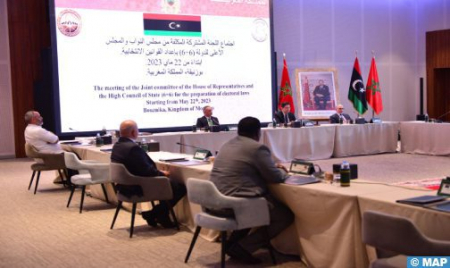Libya: ‘6+6’ Commission Announces Compromise on Electoral Laws in Bouznika
The “6+6” joint commission, tasked by the Libyan House of Representatives and Council of State with preparing the electoral laws, announced on Tuesday night in Bouznika that its members had reached a compromise on the laws governing the presidential and parliamentary elections scheduled for the end of the year, after two weeks of meetings in Morocco. The final agreement on these laws will be debated in the coming days in the presence of the presidents of the Libyan House of Representatives and Council of State, said Jalal Shwehdi, member of the House of Representatives, at the closing session of the 6+6 commission, which was attended by Omar Abu Lifa, member of the High Council of State and Nasser Bourita, Minister of Foreign Affairs, African Cooperation and Moroccan Expatriates. Shwehdi highly praised the role played by the Kingdom of Morocco in the success of this dialogue and in reaching compromises on the aforementioned electoral laws, stressing that the commission had not been subjected to any pressure from abroad. For his part, Abu Lifa affirmed that the members of the commission had reached a compromise on all the points of divergence relating to the electoral laws, specifying that two laws had been drawn up, the first of which concerned the election of parliament (House of Representatives and Senate), while the second text concerned the election of the Head of State. All that remains is the official publication of the laws by the House of Representatives as stipulated by Amendment 13 of the Constitutional Declaration to begin the electoral process, he pointed out. The outstanding points were the subject of a compromise without any foreign interference, he said, explaining that these laws do not prohibit any person from participating in the electoral process and do not provide for any exclusion, just as they offer the opportunity for political parties to play a fundamental role in the electoral process. Both laws support women’s active participation in the House of Representatives and the Senate, and broaden the country’s regional representativeness, since all remote areas and villages are represented in parliament. Abu Lifa also expressed his gratitude to Morocco for its strong support of the commission’s mission, noting that the Kingdom’s “successful efforts” had greatly facilitated the accomplishment of this mission. The Kingdom of Morocco is pursuing its efforts to find a definitive solution to the Libyan crisis in order to guarantee the unity, stability and progress of Libya, by supporting its efforts to organize elections within a comprehensive, inclusive and pragmatic framework. The Bouznika meeting is a continuation of the series of meetings hosted by the Kingdom, bringing together the various Libyan parties with a view to deepening dialogue on ways and means of resolving the crisis in the country, following an approach that provides the right space for dialogue and constructive consultation. These meetings had led to important agreements favorable to the settlement process, led by the Skhirat Agreement (2015), the agreement between the speaker of the House of Representatives, Akila Saleh, and the president of the Libyan High State Council, Khalid El Machri in October 2022 on the implementation of the results of the Bouznika process concerning sovereign positions and the unification of executive power. Morocco considers that the question of legitimacy in Libya can only be resolved through presidential and parliamentary elections, which will enable the Libyan people to choose to whom to entrust the power of political governance in the country.

